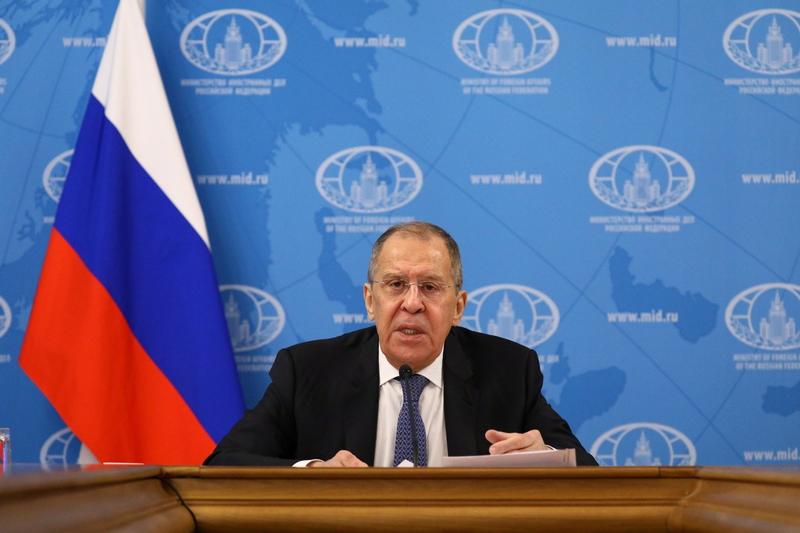 Russia's Foreign Minister Sergei Lavrov speaks during his annual news conference in Moscow, Russia on Jan 18, 2021. (PHOTO / AFP)
Russia's Foreign Minister Sergei Lavrov speaks during his annual news conference in Moscow, Russia on Jan 18, 2021. (PHOTO / AFP)
Russia and China have built a trusting relationship, and together the two countries have the ability to counter foreign threats, Russian Foreign Minister Sergei Lavrov said on Monday.
"We really have a very close strategic relationship with the People's Republic of China," he said during his annual news conference held online.
Speaking of cooperation on international platforms, Lavrov outlined the collaboration of both countries within the frameworks of the Shanghai Cooperation Organization, the BRICS, and the Eurasian Economic Union
"We can talk endlessly about Russian-Chinese cooperation that embraces a very wide range of spheres, almost all spheres of human activity, and the activities of states," he said in response to a question from a Chinese media outlet.
Speaking of cooperation on international platforms, Lavrov outlined the collaboration of both countries within the frameworks of the Shanghai Cooperation Organization, the BRICS, and the Eurasian Economic Union, or EAEU, pointing to the process of greater alignment between the EAEU and the Belt and Road Initiative.
Commenting on the recent extension of the Russia-China agreement on mutual notification for launches of ballistic missiles and carrier rockets, Lavrov emphasized that this allows both countries to contribute to ensuring stability in the Asia-Pacific region.
READ MORE: Russia's Lavrov says Bosnia's peace deal must not be changed
"I believe that this reflects the trusting, forward-looking nature of Russian-Chinese relations and our mutual focus on ensuring stability in the Asia-Pacific region, where some of our other colleagues, in particular the United States, are trying to escalate tensions, both by conducting military activities with an open bias against China and a focus on isolating Russia," the minister said.
Mutual military exercises by Russia and China seek to increase the combat readiness of the two countries, but it is not aimed against any third country, Lavrov said.
He pointed out plans by the United States to deploy missile defense systems and intermediate-range missiles in Japan and South Korea as potential threats to Russia.
"If we speak about the military situation in the region, then yes, we engage in joint work, including on military exercises. Russian-Chinese drills are nothing particularly new. They already happened several times on the ground, both in bilateral format and within the SCO. This time, the drills happened with the air forces," said Lavrov, stressing the exercises aim to heighten the combat readiness of aviation that guards both the Russian and the Chinese borders.
He also hailed the importance of the Russia-China Year of Scientific and Technological Innovation
Assistance amid pandemic
He also hailed the importance of the Russia-China Year of Scientific and Technological Innovation.
"This is probably a topic of the greatest relevance today, which is designed to give impetus, new qualities to our trade and economic cooperation," he said. "In contrast to many countries, we have managed to prevent a large decline in trade turnover amid the pandemic. It is showing steady development."
ALSO READ: Lavrov: Everyone wins if New START treaty prolonged
The minister emphasized that since the outbreak of the coronavirus pandemic, both countries have cooperated closely on a range of matters including the provision of mutual humanitarian assistance and cooperation on vaccine development.
He also said Russia will not "chase "the US military out of Syria or engage in hostilities, but it does engage in a dialogue with Washington.
"Yes, we have contacts with the US in the military-not because we recognize the legitimacy of their presence there, but simply because they have to act within certain boundaries," Lavrov said.
He blasted what the US did in Syria as "a blatant violation" to the United Nations Security Council Resolution 2254, adding "Washington's line on blocking shipments of humanitarian aid to the Syrian Arab Republic via all possible means of blackmail and ultimatums, is a violation of this resolution as well".


